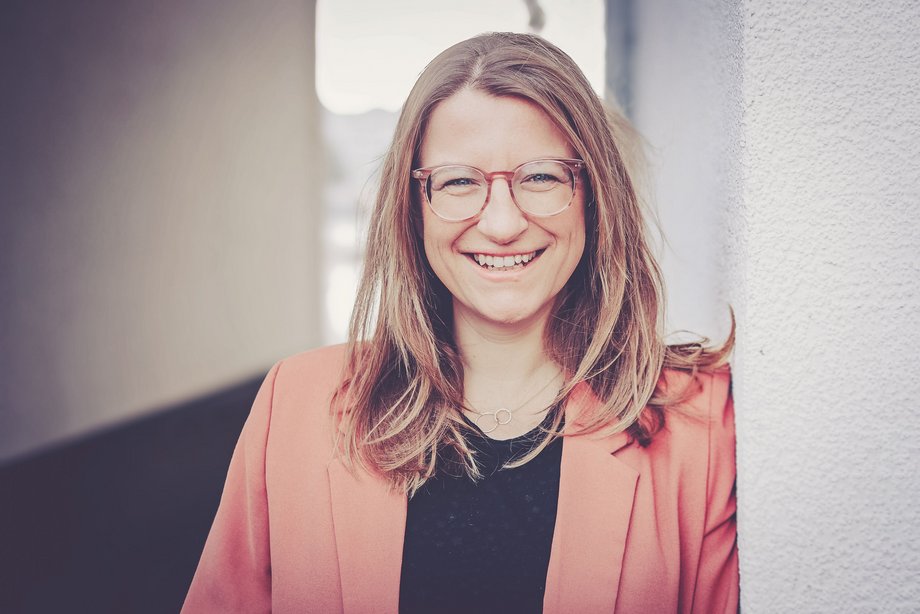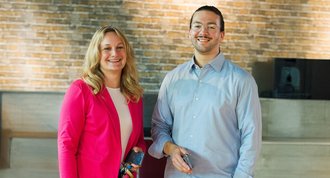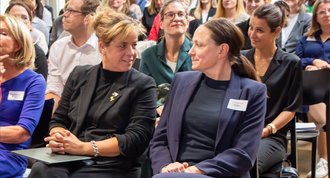
Retain talent by encouraging them and showing them prospects within the company: This is the aim of the new STEPs development dialogue, which is set to replace KNP. Anna Mili, who is responsible for the project, explains how it works, what senior managers and employees need to know and why feedback is a centrepiece.
one: Anna, STEPs replaces KNP. Or, if we break up the abbreviations: The Career and Succession Planning Process becomes Strengths-Oriented Development Planning. Why?
Anna Mili: The KNP process was a good fit in the past; around 15 years ago, we were even pioneers in the retail sector. The introduction of the development dialogue in 2019 was a huge milestone, as we managed to reach the majority of our employees in Germany at market level. In PRIMUS alone, we recently provided technical support for around 110,000 interviews. At the same time, our colleagues in Travel and Tourism and International implemented KNP in their own systems.
But the times and social requirements are different today, the self-image of retail is different, the demands on management are changing and so are the requirements for a new development process.
The question today is: How do we attract talent - and how can they develop with us in such a way that they want to stay with us? One building block for this is the new STEPs process, which will be trialled by around 10,000 administrative employees from various SBUs in the form of a pilot project over the coming months.
Self-initiative, willingness to change, mutual trust: these are the core messages of the Step up cultural initiative, which REWE Group is using to further develop its management and cooperation culture. The individual measures also include STEPs, strength-orientateddevelopmentplanning, which is currently replacing the former KNP process in a pilot project for administrative staff. Unlike KNP, STEPs is more forward-looking and focusses on the strengths and development of employees. Giving and receiving feedback plays a central role here.
As part of Step Up, the learning catalogue will offer a wide range of offers from spring onwards to help employees and senior managers internalise the core messages: In particular, the focus is on awareness of strengths, creating psychological security, developing the courage to try new things and the art of giving constructive feedback.
You can find out more about Step up and STEPs inside or here.
one: What is the main difference between STEPs and KNP and what are the key points?
Anna Mili : In contrast to the KNP dialogue, employees and senior managers no longer look back so much, but instead look forward together - as the name "strength-oriented development planning" suggests.
As already familiar from the KNP, this dialogue starts with a voluntary self-assessment by the employees. The associated STEPs sheet is documented in PRIMUS for employees participating in the pilot and in ESS for colleagues in Travel and Tourism.
„Senior managers can now ask their employees for confidential, anonymous feedback via PRIMUS.“

The development meetings between employees and senior managers are followed by talent conferences, at which the development paths of employees willing to change are discussed. And then we focus on continuous dialogue.
one: What does "continuous dialogue" between senior managers and employees mean?
Anna Mili: For us, it means that both employees and senior managers should really seek out feedback situations, which can be feedback between managers and employees, within members of a team or upward feedback, where employees give feedback to their direct manager. How, where and how often the dialogue between those giving and receiving feedback takes place is not formally specified. All teams have the freedom to try out what works best for them.
By the way: from mid-February, Upward Feedback in PRIMUS will provide senior managers in retail and administration with a tool to ask their employees for confidential, anonymous and compact feedback.
one: What is the aim of the less formal dialogue offerings?
Anna Mili: The aim is for senior managers and employees to talk more intensively and regularly about employees' strengths, willingness to change and development. Development has two meanings: It can be driven forward in the current position as well as signifying a change to a new position within the company.
„Internal changes should be more attractive than external ones. In this way, we want to retain those willing to change.“

one: What does STEPs mean in concrete terms for the two dialogue partners? Let's start with the employees.
Anna Mili: For employees, STEPs means that they receive feedback on their performance, receive feedback on their strengths or development areas and define specific development measures and prospects with their senior managers, whether in or outside of their current position. Very important here - and this actually applies to the entire Step up project - is my own initiative as an employee: Do I think about how and where I would like to develop within REWE Group? Do I approach my senior managers directly? Do I actively ask for feedback?
one: And how important is STEPs to senior managers when we look beyond the joint discussion about strengths and areas for development?
Anna Mili: They have the role of actively supporting their employees in their development. Your task is to implement the agreed development measures together, whether through new tasks or further training. Encourage your employees to help shape their own development. Support employees who are willing to change. And above all: stay in continuous dialogue!
one: What support is there specifically for employees who want to change within REWE Group?
Anna Mili : With the GO! Group Opportunities project - which we are currently working on - we are optimising our internal job market. Our aim is to make internal changes within the Group more attractive than external changes. With GO!, we want to show these employees Group-wide job prospects and approach them about suitable internal vacancies in future.
In this way, we want to keep our employees in the company and support them in utilising their strengths in the right position within the Group on their own initiative. All in the name of employee loyalty to REWE Group.
„I firmly believe that with everyone's support, we can achieve a more trusting and appreciative way of working together.“

one: How does that work in concrete terms?
Anna Mili : Specifically, employees can discuss their willingness to change in the STEPs meeting and work with their senior managers to concretise this. Internal sourcing will start at the end of the second quarter of 2024. We want to use this to actively approach employees who are willing to change for interesting positions. In addition, we are currently developing further offers to support employees who are ready for change to become active themselves and shape their own development. And last but not least, we have standardised the rules for internal job changes, for example the transfer deadlines, in order to facilitate internal transfers.
one: Finally, a look into the crystal ball: how will Step Up, and STEPs in particular, have changed our corporate culture in a few years' time?
Anna Mili: I firmly believe that with everyone's support, we will achieve a more trusting and appreciative way of working together. I am currently noticing a great willingness to engage with the topics and I am convinced that continuous feedback, for example, will become a matter of course. I would be delighted if we could create a whole new dynamic in our huge internal job market through a good dose of initiative on the part of employees and with the help of senior managers who develop people interested in change for the Group. This will make us a driver of innovation, not least through greater employee loyalty, and help us to successfully assert REWE Group on the market.
 Anna Mili 's responsibilities in the CoE Talent Management department include career and succession planning (KNP) and the new strengths-based development planning (STEPs), which is currently being piloted in administration. She notices the high level of attention that topics such as leadership, employee development and collaboration are currently receiving from the high level of interest in corresponding information events and project cafés, as well as the Management Board's requests to work on these topics. In addition to the question of how we can anchor a continuous feedback culture in our culture, the HR developer is also concerned with how we can better position ourselves as a large internal job market.
Anna Mili 's responsibilities in the CoE Talent Management department include career and succession planning (KNP) and the new strengths-based development planning (STEPs), which is currently being piloted in administration. She notices the high level of attention that topics such as leadership, employee development and collaboration are currently receiving from the high level of interest in corresponding information events and project cafés, as well as the Management Board's requests to work on these topics. In addition to the question of how we can anchor a continuous feedback culture in our culture, the HR developer is also concerned with how we can better position ourselves as a large internal job market.











